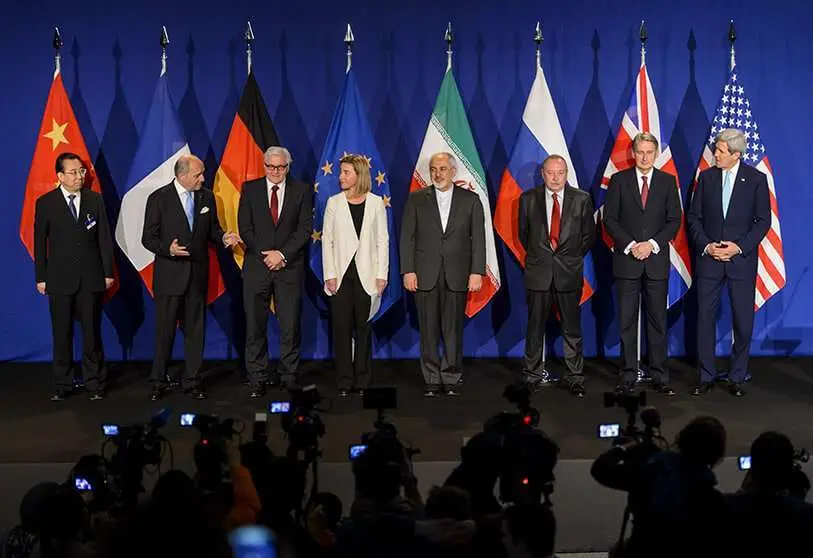Iran nuclear deal: another score for the Biden administration

Disputes over the US-Iran nuclear pact are getting closer and closer to a successful conclusion. The Democratic administration of Joe Biden has softened the talks with the Ayatollah government, which had been having a political and media dispute with the previous US administration, led at the time by the Republican and businessman Donald Trump.
It was the business tycoon who unilaterally withdrew from the nuclear deal with Iran - signed in 2015 and involving the European Union (EU) and five permanent members of the UN Security Council: China, the United States, France, the United Kingdom and Russia, plus Germany - in 2018.

Since then, the escalation of tension between the two countries has only increased. That year, Trump put an end to an agreement reached by his predecessor, the Democrat Barack Obama, resulting in the imposition of harsh sanctions on the Persian country, which served as a stimulus to breach its uranium enrichment limits. It was a full-fledged pulse-pounding.
However, last Wednesday, Ebrahim Raisi's government received a proposal from the United States - through the European Union - to continue with what was agreed seven years ago. According to Iranian Foreign Ministry spokesman Nasser Kanaani, "Iran will share its point of view with the EU, as coordinator of the nuclear talks, once Tehran's review is completed". For its part, the Biden administration confirmed through State Department spokesman Ned Price that it had, "received Iran's comments on the final text proposed by the EU. Our review of those comments is now complete. We have responded to the EU today.

In this way, the ayatollahs have agreed, after years of intense trade and financial blockades, to give in to certain US demands in order to resume the nuclear deal.
US officials tell Reuters: "The Iranians have moved closer to the possibility of returning to the agreement on terms that President Biden can accept", despite the fact that the Jewish lobby is strongly opposed to such a move. Indeed, Israel's acting prime minister, Yair Lapid, is tacitly opposed to the deal. According to Price, 'Israel has deep concerns about Iran's nuclear programme. We continue to believe that a mutual return to the nuclear deal is the most effective way to address those concerns.

This is undoubtedly an important step in Iran's energy strategy to consolidate its nuclear career, and it is also an important step for the Biden administration on foreign policy, after the president announced that his administration had succeeded in bringing down Al-Qaida leader Aiman al-Zawahiri.
Iran has decided to make a move, noting that in all these years the International Atomic Energy Agency (IAEA) has concluded in all its reports that the development of Iran's nuclear plan has always scrupulously complied with the agreed rules and that the country has not enriched uranium above 17%.
In this case it should be noted that, according to the terms of the agreement, Iran would not be allowed to enrich uranium above 20 per cent or stockpile more than 60 per cent. Why? In the event that Iran were to abandon the nuclear deal to pursue a nuclear weapon, it would take six months to do so.

For its part, the Ayatollah government's concessions to continue with the nuclear deal include declaring the Iranian Revolutionary Islamic Guard (IRGC) a foreign terrorist organisation and accepting the 'no' removal of sanctions on the IRGC. This has never been contemplated before.
In addition, Iran is, according to senior US officials, allowing the removal of the advanced centrifuges Iran is operating, including centrifuges at its fortified underground facility at Fordow.

The European Union's High Representative for Foreign Policy, Josep Borrell, who presented a new proposal to conclude the agreement at the latest round of talks held in Vienna between 4 and 8 August, has assured that most of the countries participating in the nuclear discussions agree with the EU's proposal, and that Tehran's response to the text is "reasonable".
If the agreement is restored, the IAEA could resume inspections to detect any Iranian efforts to covertly acquire a nuclear weapon, as it has been doing since the beginning. In fact, IAEA Director General Rafael Grossi indicated last Thursday that a nuclear deal with Iran "is close" after all the technical aspects have been "more or less resolved".

Grossi, who met with French President Macron on the same day, said that the agency, "the agency must do its job. We must work in cooperation with Iran to clarify the doubts about the uranium remnants in undeclared sites. We have to sit down and try to clarify all these aspects.










